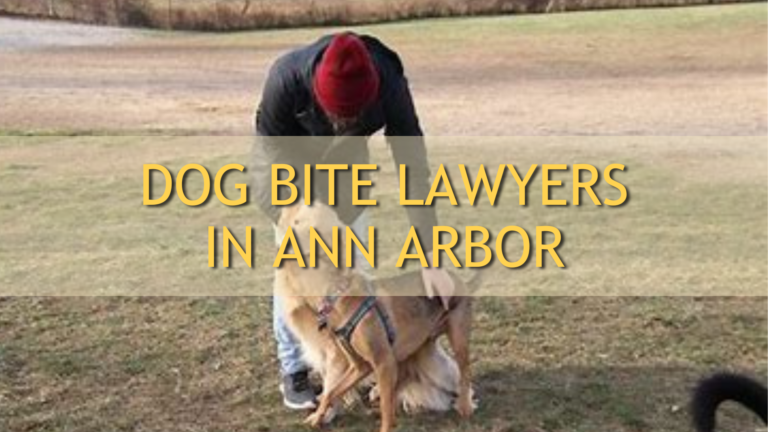Dog Laws in New Jersey
Dog ownership in the United States is incredibly popular, with over 63 million households welcoming furry companions into their lives. With such a large dog population, it’s crucial to understand the legal framework surrounding their care and behavior. Dog laws in New Jersey encompass various areas, including licensing and registration, leash regulations, public health and safety measures, and animal welfare standards. Navigating these laws ensures responsible pet ownership, promotes public safety, and safeguards the well-being of our canine friends.
Table of Contents
Dog Bite Laws in New Jersey
Dog bites can be a serious and traumatic experience, often resulting in physical and emotional injuries. New Jersey has a strict liability dog bite law in place to protect individuals from such incidents and ensure responsible dog ownership. This article provides a comprehensive overview of dog bite laws in New Jersey, including key aspects, legal definitions, and important considerations.

Understanding Strict Liability
New Jersey’s dog bite law operates under the principle of “strict liability,” meaning the dog owner is held responsible for any injuries caused by their dog’s bite, regardless of the dog’s prior behavior or the owner’s knowledge of any previous aggression. This differs from “one-bite” rules, where owners are only liable if the dog has a history of biting.
Key Provisions of the Law
The primary dog bite law in New Jersey is outlined in N.J. Stat. Ann. § 4:19-16. This statute states that a dog owner is liable for damages resulting from a bite if the victim was:
- In a public place: This includes parks, sidewalks, and other publicly accessible areas.
- Lawfully on private property: This applies to situations where the victim was invited onto the property or had legal permission to be there, such as mail carriers or delivery personnel.
Exceptions to Strict Liability
While the law generally imposes strict liability, there are a few exceptions where the owner may not be held responsible:
- Provocation: If the victim provoked the dog, such as by teasing, hitting, or cornering the animal, the owner may not be liable.
- Trespassing: The owner is not liable if the dog bites someone trespassing on their private property without permission.
Additional Considerations
- Dog Bite Quarantine: Any domestic animal that bites or scratches a human in New Jersey must be placed in a 10-day quarantine at the owner’s expense. This allows for observation and rabies testing.
- Vicious Dog Designation: If a dog attacks a person, a court can determine whether it is considered “vicious.” This designation can lead to stricter regulations or even euthanasia of the dog.
- Statute of Limitations: Victims of dog bites in New Jersey have two years from the date of the incident to file a lawsuit against the owner.
Seeking Legal Assistance
If you have been bitten by a dog, it is crucial to seek legal advice from an experienced personal injury attorney. They can help you understand your rights, navigate the legal process, and potentially pursue compensation for your injuries.
Dog Barking and Noise Laws in New Jersey
Dogs are wonderful companions, but their barking can sometimes become a nuisance for neighbors and disrupt the peace of a community. New Jersey has specific laws in place to address excessive dog barking and noise disturbances caused by pets. This article provides a comprehensive overview of these laws, including key definitions, regulations, and steps to take if you are dealing with a barking dog issue.

Noise Ordinances
New Jersey does not have a statewide law regarding dog barking. Instead, individual municipalities have the authority to enact their own noise ordinances. These ordinances typically define acceptable noise levels and set specific regulations for pet noise, including barking.
Key Provisions of Municipal Ordinances
While the specific details may vary across towns, most noise ordinances in New Jersey share common elements regarding dog barking:
- Definition of Excessive Barking: Many ordinances define excessive barking as continuous barking for a certain period (e.g., 5 minutes) or intermittent barking for a longer duration (e.g., 15 minutes).
- Time Restrictions: Some ordinances may have stricter limitations on barking during specific hours, such as nighttime.
- Responsibility of the Owner: Dog owners are responsible for ensuring their pets do not create excessive noise disturbances.
Examples of Municipal Ordinances
- Township of Cranford: Prohibits dogs from “habitually barking, howling, whining, or crying” between 10:00 PM and 6:00 AM or at any time if it disturbs the peace of neighbors.
- Voorhees Township: Defines a “noise disturbance” as barking, whining, or howling continuously for five minutes or intermittently for 15 minutes.
Resolving Barking Issues
If you are experiencing noise disturbances from a neighbor’s dog, here are some recommended steps:
- Speak to the Dog Owner: A friendly conversation with the dog owner can often be the most effective way to address the issue. Explain the problem and express your concerns politely.
- Document the Problem: Keep a record of the dates, times, and duration of the barking incidents. This can be helpful if you need to file a formal complaint.
- Contact Local Authorities: If the problem persists, you can file a complaint with your local animal control officer or police department. They can investigate the situation and potentially issue warnings or citations to the dog owner.
Preventing Barking Problems
As a dog owner, it’s crucial to take steps to minimize excessive barking:
- Provide Proper Exercise and Mental Stimulation: Regular walks, playtime, and training can help tire out your dog and reduce boredom-related barking.
- Address Separation Anxiety: If your dog barks excessively when left alone, consider crate training, providing stimulating toys, or using calming techniques.
- Desensitize Your Dog to Triggers: If your dog barks at specific stimuli like noises or people passing by, work on desensitization and counterconditioning through positive reinforcement training.
Dog Poop Disposal Laws in New Jersey
Dog waste, also known as dog poop, is a common sight in many communities. While it may seem like a minor inconvenience, it poses significant health and environmental risks. New Jersey has established dog poop disposal laws to ensure responsible pet ownership and maintain clean and healthy public spaces. This article provides a comprehensive overview of these laws, including key provisions, disposal methods, and potential consequences for non-compliance.

Dog Poop Disposal Laws
New Jersey does not have a single, statewide law regarding dog poop disposal. Instead, individual municipalities have the authority to enact their own ordinances. These ordinances typically mandate that dog owners:
- Pick up their dog’s waste immediately: This applies to both public and private property, excluding the owner’s own property.
- Dispose of the waste properly: This usually involves placing it in a designated waste bin or bagging it and discarding it in regular trash.
- Comply with specific regulations: Some ordinances may have additional requirements, such as carrying waste disposal bags while walking the dog or disposing of waste within a certain timeframe.
Examples of Municipal Ordinances
- Englewood, NJ: The “Poop & Scoop Law” requires owners to immediately and properly dispose of their dog’s waste on any property, public or private, not owned by the person.
- Middletown, NJ: The “Pet Waste Disposal Ordinance” defines proper disposal as placing the waste in a designated waste receptacle or bagging it and discarding it in regular trash.
- Toms River, NJ: The “Disposal of Pet Waste” ordinance mandates immediate and proper disposal of dog waste, with violations subject to fines.
Importance of Responsible Dog Poop Disposal
Dog poop can pose various health and environmental risks if not disposed of properly:
- Public Health: Dog waste contains harmful bacteria and parasites that can spread diseases to humans and other animals.
- Water Quality: When washed into waterways, dog waste can contaminate drinking water sources and harm aquatic life.
- Environmental Pollution: Dog poop contributes to nutrient pollution, leading to algal blooms and harming the overall health of ecosystems.
Consequences of Non-Compliance
Failure to comply with dog poop disposal laws can result in fines and penalties. The specific amount may vary depending on the municipality and the severity of the violation. In some cases, repeat offenders may face additional consequences, such as community service or court appearances.
Tips for Responsible Dog Poop Disposal
- Always carry waste disposal bags: Make it a habit to carry bags with you on every walk to ensure you can clean up after your dog.
- Dispose of waste in designated bins: Look for waste receptacles specifically designed for dog waste, often located in parks and other public areas.
- Double-bagging for extra security: This helps prevent leaks and ensures proper containment of the waste.
- Dispose of waste in your own trash: If no designated bins are available, bag the waste and dispose of it in your regular household trash.
Dog Licensing Laws in New Jersey
Owning a dog is a rewarding experience, but it comes with responsibilities. One crucial aspect of responsible pet ownership in New Jersey is ensuring your dog is properly licensed. This article provides a comprehensive overview of dog licensing laws in New Jersey, including key requirements, procedures, and the benefits of compliance.

Statewide Licensing Requirement
New Jersey mandates that all dogs seven months of age or older must be licensed annually through the municipality where the owner resides. This requirement applies to all breeds, regardless of size or temperament.
Licensing Process
To obtain a dog license, you’ll need to contact your local municipal licensing clerk. The process typically involves:
- Completing an application form: This form usually requires information about the dog, such as breed, age, and vaccination status.
- Providing proof of rabies vaccination: A current rabies vaccination certificate issued by a licensed veterinarian is mandatory. The vaccination must be valid for at least ten months of the licensing period.
- Paying the licensing fee: The fee varies depending on the municipality but generally ranges from $1.50 to $21.00 per dog.
- Receiving the license tag: Once the application is processed and fees are paid, you’ll receive a physical tag or digital license for your dog. This tag should be attached to your dog’s collar at all times.
Additional Fees and Considerations
In addition to the base licensing fee, some municipalities may collect additional fees:
- Rabies Trust Fund Fee: $1.00 per dog, which goes towards supporting state rabies and animal control programs.
- Animal Population Control Fee: $3.00 per dog that is not spayed or neutered, which funds the New Jersey low-cost spay and neuter program.
- Pilot Clinic Fee: $0.20 per dog, which supports the state’s pilot clinic program for low-cost veterinary services.
It’s important to check with your local municipality for any specific requirements or additional fees they may have.
Benefits of Dog Licensing
Complying with dog licensing laws offers several benefits:
- Tracking and Identification: Dog licenses help authorities track lost or stray animals and reunite them with their owners.
- Public Health and Safety: Licensing ensures dogs are vaccinated against rabies, a potentially fatal disease for humans and animals.
- Funding for Animal Control: Licensing fees contribute to vital animal control services, including sheltering, adoption programs, and rabies prevention efforts.
- Responsible Pet Ownership: Obtaining a license demonstrates responsible pet ownership and commitment to community safety.
Consequences of Non-Compliance
Failing to license your dog can result in fines and penalties. The specific amount may vary depending on the municipality and the length of time the dog has been unlicensed. In some cases, animal control officers may impound unlicensed dogs.
Keeping Your Dog Licensed
To maintain compliance, it’s crucial to:
- Renew your dog’s license annually: Licenses typically expire on June 30th each year.
- Update your information: If you move or your dog’s vaccination status changes, inform your local licensing clerk.
- Report lost or stolen tags: If your dog’s license tag is lost or stolen, report it immediately and obtain a replacement.
Dog Leash Laws in New Jersey
Ensuring the safety and well-being of both dogs and humans is crucial in any community. New Jersey has established comprehensive dog leash laws to promote responsible pet ownership and maintain public safety. This article provides a detailed overview of these laws, including key requirements, exceptions, and the importance of compliance.
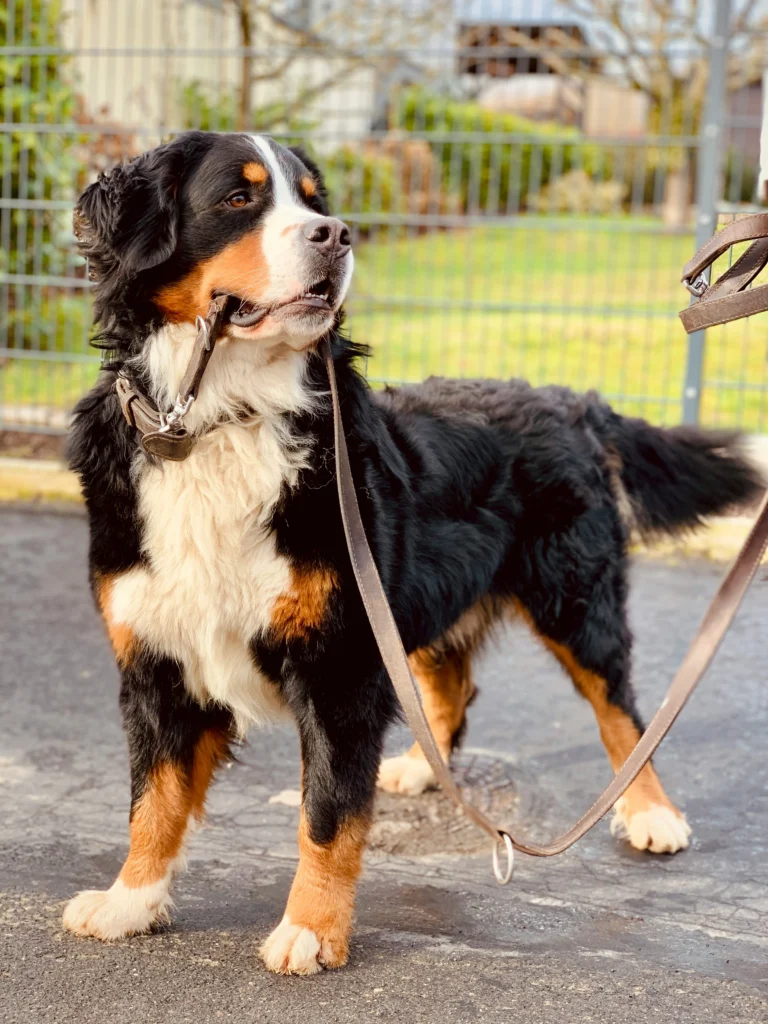
Statewide Leash Law
New Jersey’s “Responsible Dog Ownership Act” mandates that all dogs must be leashed or confined at all times when outside their owner’s property. This applies to all public spaces, including:
- Sidewalks
- Parks
- Streets
- Public buildings
- Common areas in apartment complexes
Leash Requirements
- Length: Leashes should be no longer than six feet in length to ensure proper control.
- Material: Leashes should be made of strong, durable material to prevent accidental breakage.
- Control: The owner must maintain control of the dog at all times, meaning they can guide and restrain the animal effectively.
Exceptions to Leash Laws
While the leash law applies broadly, there are some specific exceptions:
- Designated Dog Parks: Dogs can be off-leash in designated dog parks, provided they are properly licensed and vaccinated.
- Private Property: Dogs can be off-leash on their owner’s private property, with the owner’s permission.
- Training: In some cases, dogs may be off-leash for training purposes, under the direct supervision of a qualified trainer.
Importance of Leash Laws
Complying with leash laws is crucial for several reasons:
- Public Safety: Leashes prevent dogs from running into traffic, causing accidents, or approaching people or other animals in an uncontrolled manner.
- Animal Welfare: Leashes protect dogs from getting lost, injured, or engaging in fights with other animals.
- Community Harmony: Leashed dogs create a more comfortable and safe environment for everyone enjoying public spaces.
Consequences of Non-Compliance
Failing to comply with leash laws can result in fines and penalties. The specific amount may vary depending on the municipality and the severity of the violation. In some cases, animal control officers may impound the dog.
Additional Considerations
- Responsible Leash Walking: Even on leash, it’s important to be a responsible dog owner. This includes picking up after your dog, maintaining awareness of your surroundings, and avoiding situations that could lead to conflict with other people or animals.
- Checking Local Ordinances: While the state law provides a general framework, some municipalities may have additional regulations or specific leash.
Dangerous Dog Laws in New Jersey
Dog bites and attacks can be traumatic and life-altering experiences, posing a significant threat to public safety. New Jersey has established a framework of “dangerous dog” laws to address such incidents, protect the community, and ensure responsible pet ownership. This article provides a comprehensive overview of these laws, including definitions, procedures, and the owner’s responsibilities.

Key Definitions
- Vicious Dog: A dog that has caused serious bodily injury or death to a human without provocation.
- Potentially Dangerous Dog: A dog that has:
- Caused serious bodily injury to a person during an unprovoked attack.
- Caused serious bodily injury or death to another domestic animal.
- Displayed aggressive behavior that poses a serious threat of serious bodily injury or death to a person or another domestic animal.
Determining Dangerous Dog Status
A dog’s status as “vicious” or “potentially dangerous” is determined through a hearing in the municipal court. The court considers evidence, including:
- Witness testimonies: Statements from individuals who witnessed the incident.
- Veterinarian reports: Medical records documenting the injuries sustained.
- Animal control reports: Observations and assessments by animal control officers.
Consequences for Dangerous Dogs
- Vicious Dogs:
- The court may order the dog to be euthanized.
- In rare cases, the court may allow the owner to keep the dog under strict conditions, such as:
- Muzzle requirement in public spaces.
- Secure enclosure with restricted access.
- Liability insurance coverage.
- Potentially Dangerous Dogs:
- The court may impose various restrictions, including:
- Obtaining a “potentially dangerous dog” license and registration.
- Displaying a warning sign on the owner’s property.
- Building a secure enclosure to house the dog.
- Maintaining liability insurance coverage.
- Completing obedience training or behavior modification programs.
- The court may impose various restrictions, including:
Owner’s Responsibilities
If your dog is deemed “vicious” or “potentially dangerous,” you are legally obligated to:
- Comply with all court-ordered restrictions.
- Ensure the dog is properly secured and prevented from harming others.
- Maintain accurate registration and licensing.
- Be aware of your legal and financial liabilities.
Exceptions to Dangerous Dog Designation
A dog may not be declared dangerous if:
- The incident was provoked by the victim.
- The dog was defending itself or its owner from a threat.
- The victim was trespassing on the owner’s property.
Dog Health and Welfare Laws in New Jersey
New Jersey prioritizes the well-being of animals, including dogs. Several laws and regulations are in place to ensure their health, safety, and proper care.

Animal Cruelty Prevention
New Jersey has strict laws against animal cruelty, outlined in N.J.S.A. 4:22-17. These laws prohibit:
- Intentional infliction of pain or suffering: This includes physical abuse, neglect, and abandonment.
- Failing to provide necessary care: This encompasses adequate food, water, shelter, and veterinary attention.
- Exposing animals to harmful conditions: This includes extreme temperatures, unsanitary environments, and dangerous situations.
Consequences of Animal Cruelty
Violations of animal cruelty laws can result in:
- Fines: Depending on the severity of the offense, fines can range from hundreds to thousands of dollars.
- Imprisonment: In extreme cases, individuals may face jail time.
- Community service: Courts may order community service as part of the penalty.
- Animal confiscation: Authorities may seize animals if their safety and well-being are at risk.
Proper Sheltering and Tethering
New Jersey’s “Proper Sheltering and Tethering of Dogs and Companion Animals Act” (N.J.S.A. 4:22-17.3) provides specific regulations for housing and tethering dogs:
- Proper Shelter:
- Dogs must have access to a clean, dry, and structurally sound shelter that protects them from weather extremes.
- The shelter must be appropriate for the size and breed of the dog.
- Continuous access to proper shelter is required for more than 30 minutes when the owner is not present.
- Tethering:
- Dogs cannot be tethered for more than 30 minutes unless the owner is present and can continuously monitor the animal.
- Tethering devices must be appropriate for the size and strength of the dog and allow for movement and access to food, water, and shelter.
Rabies Vaccination Requirements
New Jersey mandates rabies vaccination for all dogs seven months of age and older (N.J.S.A. 4:19-15.12). This vaccination must be administered by a licensed veterinarian and kept up-to-date according to state regulations.
Reporting Animal Cruelty
If you suspect animal cruelty or neglect, it’s crucial to report it immediately. You can contact:
- Local Animal Control: Your local animal control office will investigate the situation and take appropriate action.
- New Jersey SPCA: The New Jersey SPCA investigates animal cruelty complaints and provides rescue and rehabilitation services.
- Law Enforcement: In severe cases, you can contact your local police department.
Dog Public Access Laws in New Jersey
Dogs are beloved members of many families, and taking them for walks, hikes, and other outings is a common way to bond and enjoy the outdoors. However, navigating public spaces with your dog requires understanding the specific laws and regulations in place.
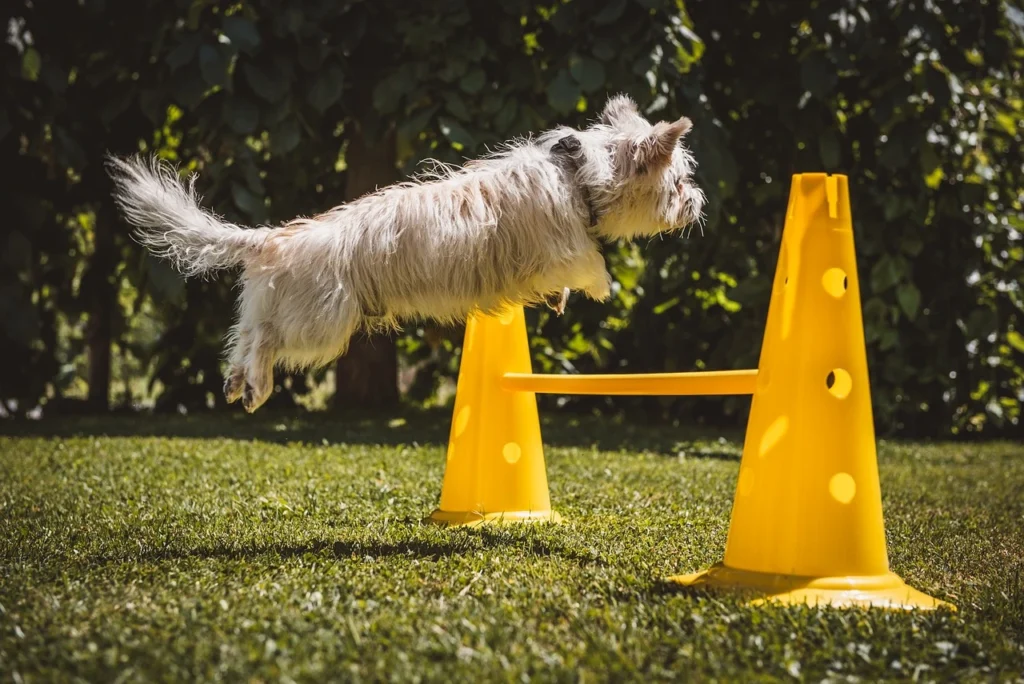
General Public Access
New Jersey does not have a single, statewide law governing dog access to all public spaces. Instead, individual municipalities have the authority to establish their own regulations. This means the specific rules regarding dog access can vary depending on the location.
Designated Dog Parks
Many towns and cities in New Jersey have designated dog parks where dogs can be off-leash and socialize freely. These parks typically have specific rules and regulations, such as:
- Hours of operation: Dog parks may have designated hours when they are open for use.
- Size and breed restrictions: Some parks may have restrictions based on the size or breed of the dog.
- Waste disposal requirements: Dog owners are responsible for picking up after their dogs and disposing of waste properly in designated bins.
- Aggressive behavior: Any dog displaying aggressive behavior may be asked to leave the park.
Restrictions and Prohibited Areas
While dog parks offer designated off-leash areas, some public spaces in New Jersey have restrictions or complete prohibitions on dogs:
- Beaches: Some beaches may have seasonal or year-round restrictions on dogs. Always check signage and local ordinances before bringing your dog to the beach.
- State Parks and Forests: Some state parks and forests may have restrictions on dog access or require dogs to be leashed at all times.
- Private Property: Access to private property, such as businesses and residential areas, is at the discretion of the owner and may be restricted for dogs.
Responsible Public Access
Even in areas where dogs are allowed, responsible pet ownership is crucial:
- Leash Laws: Always comply with leash laws in public spaces unless at a designated dog park.
- Voice control: Maintain control of your dog using voice commands and positive reinforcement.
- Waste disposal: Pick up after your dog and dispose of waste properly in designated bins.
- Respect for others: Be mindful of other people and animals in public spaces.
Dog Travel and Transportation Laws in New Jersey
Traveling with your furry companion can be a rewarding experience, but it’s crucial to understand the specific laws and regulations in place to ensure their safety and compliance.

Vehicle Restraint Requirements
New Jersey law mandates that all non-crated dogs and cats be secured in an appropriately sized, properly adjusted, and fastened seat belt restraint system while traveling in a passenger automobile (N.J.S.A. 39:3-78.1). This applies to both the driver and front passenger seats.
Failure to comply with this law can result in
- Fines: Ranging from $250 to $1,000.
- Animal cruelty charges: In severe cases.
Acceptable Restraint Options
- Harnesses: Specifically designed for car travel and crash-tested for safety.
- Carriers: Securely fastened to the car seat or placed on the floor behind the front seats.
- Barriers: Dividing the front and back seats to prevent dogs from entering the driver’s area.
Airline Travel
Airlines have their own specific regulations for transporting dogs, including:
- Breed restrictions: Some airlines may restrict certain breeds due to safety concerns.
- Size and weight limits: Airlines typically have limitations on the size and weight of dogs allowed in the cabin or as checked baggage.
- Crate requirements: Dogs must travel in airline-approved crates that meet specific size and ventilation requirements.
- Health certificates: Certain airlines may require health certificates or vaccination records for dogs traveling.
It’s crucial to contact your chosen airline well in advance of your trip to understand their specific policies and procedures for dog travel.
Ground Transportation
- Taxis and Ridesharing Services: Some taxi and ridesharing companies may allow dogs, but it’s important to check their individual policies and book pet-friendly options.
- Trains and Buses: NJ Transit generally does not allow pets on board, except for service animals.
- Personal Vehicles: Always ensure your dog is properly restrained while traveling in your personal vehicle, adhering to New Jersey’s vehicle restraint law.
Additional Considerations
- Temperature Control: Never leave your dog unattended in a parked car, especially during extreme temperatures.
- Rest Stops and Breaks: Provide your dog with regular breaks for bathroom visits and exercise during long journeys.
- Identification: Ensure your dog is wearing a collar with an ID tag and is microchipped for identification purposes.
- Travel Anxiety: Some dogs experience anxiety while traveling. Consult your veterinarian for advice on managing travel anxiety and potentially using calming aids.
Dog Housing and Accommodation Laws in New Jersey
Finding suitable housing for yourself and your furry companion can be challenging, especially when navigating the legal landscape.

Landlord-Tenant Laws
New Jersey does not have a statewide law prohibiting landlords from including “no-pet” clauses in leases. This means landlords have the discretion to decide whether they allow pets in their rental properties. However, there are some exceptions and limitations:
- Senior Citizen Housing: State and federal laws generally prohibit landlords from discriminating against tenants based on age. This includes not allowing pets in senior citizen housing complexes.
- Handicapped, Blind, or Deaf Tenants: The New Jersey Law Against Discrimination (LAD) prohibits landlords from discriminating against tenants with disabilities based on their need for assistance animals.
- Working Dogs: New Jersey Revised Statutes 10:5-29.9 protects the right of police, fire, and other emergency service personnel to have their working dogs reside with them in rental housing, even if the property has a “no-pet” policy.
It’s crucial to review your lease agreement carefully and understand the specific pet policies of your landlord.
Condominium and Cooperative Communities
Condominium and cooperative communities often have their own set of rules and regulations regarding pets, including:
- Breed restrictions: Some communities may restrict certain breeds based on size, temperament, or perceived safety concerns.
- Size and weight limits: Communities may have limitations on the size and weight of pets allowed.
- Pet fees and deposits: Additional fees or deposits may be required for pet owners.
The New Jersey Law Against Discrimination (LAD) can require a condominium association to allow a resident to keep an emotional support dog as an accommodation for a disability, even if the dog exceeds the association’s weight limit for pets.
Service and Assistance Animals
The Fair Housing Act (FHA) and the New Jersey Law Against Discrimination (LAD) protect the rights of individuals with disabilities to live with their service and assistance animals in housing, regardless of “no-pet” policies.
- Service animals: These are dogs individually trained to perform tasks to assist individuals with disabilities, such as guide dogs for the visually impaired or seizure alert dogs.
- Emotional support animals: While not service animals, ESA’s provide emotional support and companionship to individuals with disabilities.
Landlords cannot discriminate against tenants with service or assistance animals, and they must provide reasonable accommodations.
Additional Considerations
- Breed-Specific Legislation: New Jersey does not have any statewide breed-specific legislation restricting dogs based solely on breed. However, individual municipalities may have their own ordinances.
- Animal Control Regulations: Local animal control ordinances may have specific requirements regarding the number of pets allowed per household and other animal welfare regulations.
- Responsible Pet Ownership: Regardless of the legal landscape, responsible pet ownership is crucial. This includes ensuring your dog is properly licensed, vaccinated, and well-behaved.
Dog Adoption and Sale Laws in New Jersey
Bringing a furry friend into your life is a rewarding experience, but it’s crucial to understand the legal landscape surrounding dog adoption and sale in New Jersey.

Pet Purchase Protection Act
The New Jersey Pet Purchase Protection Act aims to protect consumers buying dogs, cats, and rabbits from pet shops. This law requires:
- Veterinary Examination: All animals sold in pet shops must be examined by a licensed veterinarian within five days before being offered for sale.
- Health Certificate: A health certificate documenting the examination and any recommended treatment must be provided to the buyer.
- Guarantees: Pet shops must offer a 14-day guarantee against certain health conditions and a 1-year guarantee against genetic defects.
- Return Policy: Buyers have the right to return the animal within the specified timeframe for a full refund or exchange.
Licensing and Registration
New Jersey requires all dogs over seven months old to be licensed and registered with the local animal control office. This license helps track ownership and ensures dogs are vaccinated against rabies.
- Fees: License fees vary depending on the municipality and whether the dog is spayed or neutered.
- Renewal: Licenses need to be renewed annually.
- Exemptions: Service animals may be exempt from licensing requirements.
Proposed Legislation
In 2022, New Jersey introduced Bill S3421, which aims to:
- Ban the sale of cats, dogs, and rabbits in pet shops: This would encourage adoption from shelters and rescue organizations.
- Prohibit animal shelters and rescues from obtaining animals from breeders: This aims to reduce reliance on commercial breeding and promote responsible sourcing.
- Penalties: Violations of the proposed law would result in fines.
While not yet enacted, this proposed legislation could significantly impact dog adoption and sale in New Jersey.
Additional Considerations
- Responsible Breeding Practices: If considering buying a dog from a breeder, ensure they follow ethical breeding practices and prioritize the health and well-being of their animals.
- Adopting from Shelters and Rescues: Many wonderful dogs are waiting for loving homes in shelters and rescue organizations. Adopting offers a second chance to a deserving animal and helps reduce shelter overcrowding.
- Breed-Specific Legislation: While New Jersey does not have statewide breed-specific bans, some municipalities may have local ordinances restricting certain breeds.
Dog Park and Recreation Laws in New Jersey
New Jersey offers numerous opportunities for dog owners to enjoy the outdoors with their furry friends. Dog parks provide designated off-leash areas for socialization and exercise, while other recreational spaces may have specific regulations regarding dogs. Understanding these laws ensures a safe and enjoyable experience for everyone.

General Dog Park Regulations
While specific rules may vary slightly between municipalities, most dog parks in New Jersey share common regulations:
- Leash Requirements: Dogs must be leashed on entering and exiting the park.
- Supervision: Owners must remain with their dogs at all times and be responsible for their behavior.
- Waste Disposal: Owners must clean up after their dogs and dispose of waste properly in designated bins.
- Aggressive Behavior: Dogs displaying aggressive behavior must be leashed and removed from the park immediately.
- Vaccinations: Dogs must be up-to-date on all required vaccinations, including rabies.
- License Tags: Dogs must wear a collar with a current license tag.
- Additional Restrictions: Some parks may have limitations on age, breed size, or the number of dogs per person.
Examples of Specific Dog Park Regulations
- Age Restrictions: Some parks may have minimum age requirements for dogs using the off-leash area.
- Breed Restrictions: While New Jersey does not have statewide breed-specific bans, some municipalities or individual parks may have restrictions on certain breeds.
- Permit Requirements: Certain parks may require a permit for entry, which can be obtained through the local park authority.
Finding Dog Parks
- Municipal Websites: Many municipalities list their dog parks and their specific rules and regulations on their websites.
- Online Resources: Websites like BringFido.com and [invalid URL removed] provide comprehensive listings of dog parks across New Jersey, including user reviews and photos.
Beyond Dog Parks
While dog parks offer dedicated off-leash areas, other recreational spaces may have specific regulations regarding dogs:
- State Parks and Forests: Some state parks and forests allow dogs on leash on designated trails.
- Beaches: Some beaches have seasonal or year-round restrictions on dogs.
- Private Property: Access to private property, such as businesses and residential areas, is at the discretion of the owner and may be restricted for dogs.
Additional Considerations
- Responsible Pet Ownership: Always be mindful of other park users and their pets.
- Respectful Behavior: Maintain control of your dog and avoid excessive barking or disruptive behavior.
- Emergency Preparedness: Carry a leash, water bowl, and waste bags at all times.
- Weather Conditions: Be aware of extreme temperatures and adjust your visit accordingly.
Dog Food and Nutrition Laws in New Jersey
Feeding your dog a nutritious and balanced diet is crucial for their overall health and well-being. While New Jersey doesn’t have specific laws solely dedicated to dog food, several regulations and resources exist to ensure the safety and quality of pet food sold within the state.

Federal Food, Drug, and Cosmetic Act (FD&C Act)
New Jersey has adopted the federal FD&C Act, which sets the overarching framework for pet food safety and labeling in the United States. This law mandates that pet food be:
- Pure and wholesome: Free from harmful or deleterious substances.
- Truthfully labeled: Providing accurate information about ingredients and nutritional content.
Key Labeling Requirements
The FD&C Act requires pet food labels to include:
- Product name: Clearly identifying the food as intended for dogs.
- Quantity statement: Net weight or volume of the product.
- Ingredient list: Ordered by predominance by weight.
- Nutritional adequacy statement: AAFCO (Association of American Feed Control Officials) feeding profiles or specific nutrient levels.
- Manufacturer information: Contact details for the company.
New Jersey Commercial Feed Law
This state law regulates the manufacture, distribution, and labeling of commercial feed, including pet food. It requires:
- Registration: Manufacturers and distributors of commercial feed must register with the New Jersey Department of Agriculture.
- Labeling standards: Labels must comply with the FD&C Act and provide additional information specific to New Jersey regulations.
- Safety and quality control: Manufacturers are responsible for ensuring the safety and quality of their products.
Proposed Pet Food Safety Act
In 2023, New Jersey introduced Bill A4171, the “Pet Food Safety Act.” This proposed legislation aims to:
- Strengthen safety regulations: Implement stricter standards for pet food safety and quality control.
- Increase transparency: Require more detailed labeling information, including the source of ingredients.
- Enhanced enforcement: Provide the Department of Agriculture with greater authority to investigate and address pet food safety concerns.
While not yet enacted, this proposed law could significantly impact pet food regulations in New Jersey.
Additional Considerations
- Consult your veterinarian: They can advise on the best diet for your dog based on their age, breed, and individual needs.
- Research and choose reputable brands: Look for dog food brands with transparent labeling and a commitment to using high-quality ingredients.
- Be aware of recalls: Stay informed about pet food recalls and follow the manufacturer’s instructions if your dog’s food is affected.
Dog Health and Veterinary Care Laws in New Jersey
Understanding the legal framework surrounding dog health and veterinary care in New Jersey is crucial for responsible pet ownership.

Rabies Vaccination
New Jersey mandates rabies vaccination for all dogs over seven months old, regardless of whether they are kept indoors or outdoors. This requirement helps protect both public health and the health of your dog.
- Vaccination Schedule: The initial rabies vaccine is followed by boosters at specific intervals, depending on the type of vaccine used.
- Proof of Vaccination: Dog owners must keep a valid rabies vaccination certificate and present it when obtaining a license or upon request by animal control officers.
Licensing and Registration
All dogs over seven months old must be licensed and registered with the local animal control office. This license helps track ownership, facilitates the return of lost pets, and ensures dogs are vaccinated against rabies.
- Fees: License fees vary depending on the municipality and whether the dog is spayed or neutered.
- Renewal: Licenses need to be renewed annually.
- Exemptions: Service animals may be exempt from licensing requirements.
Animal Cruelty and Neglect
New Jersey has strict laws against animal cruelty and neglect. These laws define prohibited acts and provide penalties for violations.
- Prohibited Acts: Examples include failing to provide adequate food, water, shelter, and veterinary care; abandoning an animal; and inflicting unnecessary suffering.
- Reporting: If you suspect animal cruelty or neglect, you can report it to your local animal control agency or the New Jersey SPCA.
Proper Sheltering
New Jersey law prohibits exposing dogs and other companion animals to adverse environmental conditions for extended periods. This ensures their basic needs for shelter, food, and water are met.
- Specific Requirements: “Proper shelter” includes access to a clean, dry, and temperature-controlled space of appropriate size, with protection from the elements.
- Tethering: Tethering of dogs is also regulated, with limitations on duration and access to proper shelter.
Veterinary Practice and Licensing
Only licensed veterinarians can legally perform veterinary medicine and surgery in New Jersey. This ensures animals receive proper care from qualified professionals.
- Veterinarian Licensing: The New Jersey Board of Veterinary Medical Examiners regulates the practice of veterinary medicine and issues licenses to qualified individuals.
- Complaints: If you have concerns about a veterinarian’s conduct, you can file a complaint with the Board.
Additional Considerations
- Regular Veterinary Checkups: It’s crucial to schedule regular checkups with your veterinarian for preventive care, vaccinations, and early detection of potential health problems.
- Responsible Pet Ownership: Always prioritize your dog’s well-being and provide them with a loving and healthy environment.
- Stay Informed: Stay updated on any changes to dog health and veterinary care laws in your area.
Dog Identification and Microchipping Laws in New Jersey
Losing a beloved pet is a heartbreaking experience. Fortunately, New Jersey has laws in place to increase the chances of a happy reunion through proper identification and microchipping.

Microchipping Requirements
While there is no statewide mandate for microchipping dogs in New Jersey, several regulations highlight its importance:
- Shelters and Rescue Organizations:
- Scanning for Microchips: Shelters and rescue organizations must scan all incoming animals for microchips before releasing them for adoption, transfer, or euthanasia.
- Contacting Owners: If a microchip is found, the shelter must attempt to contact the owner using the registered information.
- Holding Period: Animals with microchips must be held for at least seven days after owner notification to allow for a potential reunion.
- Animal Control:
- Identification Efforts: Animal control officers prioritize checking for microchips when impounding stray or lost dogs.
- Reuniting Owners: If a microchip is found, the officer attempts to contact the owner and return the dog.
Importance of Microchipping
Despite the absence of a statewide mandate, microchipping your dog is highly recommended. Here’s why:
- Permanent Identification: Unlike collars and tags, microchips are permanently implanted and cannot be lost or removed.
- Increased Reunion Chances: Microchipping significantly increases the likelihood of being reunited with your lost pet, even if they travel far from home.
- Universal Scanning: Microchips can be scanned by any veterinarian, animal shelter, or animal control agency, regardless of location.
Additional Considerations
- Microchip Registration: Ensure your microchip is registered with a reputable pet recovery service and keep your contact information updated.
- Collar and ID Tag: Always equip your dog with a collar and ID tag containing your current contact information.
- Regular Updates: Update your contact information with the microchip registry and on your dog’s ID tag whenever necessary.
Dog Breeding and Genetics Laws in New Jersey
New Jersey has a framework of laws and regulations aimed at promoting responsible dog breeding practices and protecting the health and well-being of animals.
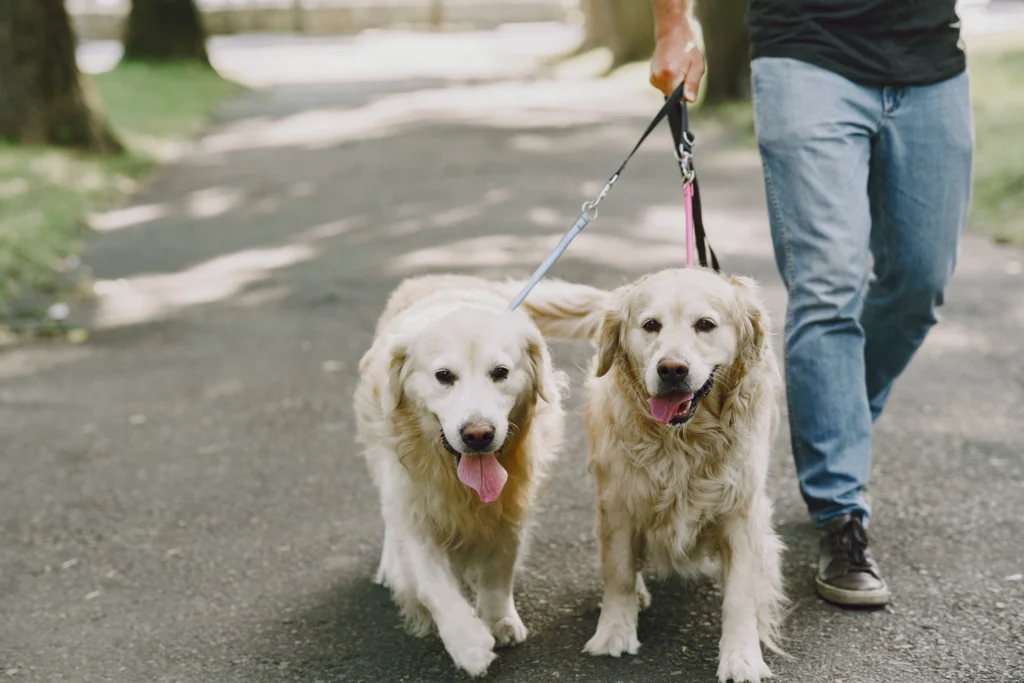
Existing Kennel Regulations
- Licensing:
- Any person operating a kennel for breeding or selling dogs must obtain a license from the local municipality.
- The license application process typically involves inspections of the kennel facilities to ensure adequate housing, sanitation, and animal care standards.
- Animal Welfare:
- New Jersey’s animal cruelty and neglect laws apply to all animals, including those kept for breeding purposes.
- Breeders have a legal responsibility to provide their animals with adequate food, water, shelter, veterinary care, and humane treatment.
Proposed Legislation
- Bill A4051:
- Introduced in 2024, this bill proposes:
- Banning the sale of cats, dogs, and rabbits in pet shops: This aims to reduce reliance on commercial breeding and encourage adoption from shelters and rescues.
- Limiting the number of dogs sold per breeder: The bill defines a “breeder” as anyone selling more than five dogs per year and restricts them to selling a maximum of 25 dogs annually.
- Annual breeder registration: Breeders selling cats or dogs would need to register with the New Jersey Department of Health.
- This proposed legislation has generated significant debate and opposition from some breeders who argue it unfairly targets responsible practices.
- Introduced in 2024, this bill proposes:
Additional Considerations
- Genetic Testing:
- While not legally mandated, responsible breeders often conduct genetic testing for their breeding stock to identify potential health problems and avoid passing them on to offspring.
- This helps ensure the health and well-being of puppies and reduces the risk of inheritable diseases.
- Breed-Specific Concerns:
- Certain breeds may be predisposed to specific health issues.
- Responsible breeders should be knowledgeable about these potential concerns and take steps to mitigate them through selective breeding and proper care.
- Ethical Sourcing:
- When considering purchasing a puppy from a breeder, research their practices and ensure they prioritize the health and well-being of their animals.
- Look for breeders who conduct genetic testing, provide proper socialization and care for their puppies, and prioritize ethical breeding practices.
Dog Environmental Impact Laws in New Jersey
New Jersey, like many states, recognizes the environmental impact of pet ownership. Responsible dog owners play a crucial role in protecting our water, land, and wildlife. This article provides a comprehensive overview of key laws and regulations related to dog waste management and responsible pet behavior in natural areas.

Waste Management
- Picking Up Waste: New Jersey has “nuisance laws” prohibiting pet owners from allowing their dogs’ waste to remain on public or private property. This includes parks, sidewalks, and residential areas.
- Proper Disposal: Dog waste should be picked up and disposed of properly. This can be done by:
- Bagging and disposing of waste in trash cans.
- Flushing it down the toilet (if permitted by local regulations).
- Using designated pet waste disposal stations at parks and public spaces.
- Fines and Penalties: Failure to pick up after your dog can result in fines or other penalties.
Additional Considerations
- Water Quality Protection: Dog waste contains harmful bacteria and nutrients that can pollute waterways and contribute to harmful algal blooms.
- Public Health: Dog waste can also pose a public health risk if not disposed of properly.
- Biodegradable Bags: Using biodegradable bags for waste collection is an environmentally friendly option.
Responsible Pet Behavior in Natural Areas
- Leash Laws: Many state parks, forests, and other natural areas require dogs to be on leash at all times. This helps protect wildlife, other pets, and the natural environment.
- Designated Off-Leash Areas: Some parks and recreation areas may have designated off-leash zones where dogs can run freely under owner supervision.
- Wildlife Protection: Dogs should not be allowed to chase or harass wildlife. This can be harmful to both the animals and the ecosystem.
- Leave No Trace: Responsible pet owners should follow “Leave No Trace” principles by cleaning up after their dogs and minimizing their impact on the environment.
Dog Behavioural Training Laws in New Jersey
While there are currently no statewide laws mandating the licensing of dog trainers in New Jersey, the state is actively considering legislation to address this issue.

Current Situation
- No Mandatory Licensing: Currently, New Jersey does not require dog trainers to be licensed. This means anyone can offer dog training services without formal qualifications or oversight.
- Voluntary Certification: While there is no legal requirement, many dog trainers choose to pursue voluntary certifications through reputable organizations like the Certification Council for Professional Dog Trainers (CCPDT). These certifications demonstrate a commitment to professional standards and ethical practices.
- Consumer Protection Concerns: The lack of mandatory licensing raises concerns about consumer protection and the potential for unqualified individuals to offer ineffective or even harmful training methods.
Proposed Legislation
- Bill A5364 (2022): This bill, introduced in 2022, proposed the creation of a Dog Trainer Licensing Board and the requirement for dog trainers to obtain a license to practice in the state.
- Key Provisions:
- Licensing Requirements: The bill outlined criteria for licensure, including minimum education and training hours, passing an exam, and demonstrating good moral character.
- Exemptions: Existing dog trainers with sufficient experience would be eligible for exemptions.
- Consumer Protection: The bill aimed to protect consumers by ensuring dog trainers meet established standards and promoting ethical practices.
Current Status of Proposed Legislation
- Conditional Veto by Governor: Governor Phil Murphy conditionally vetoed Bill A5364 in 2023, expressing concerns about the proposed training hour requirement.
- Ongoing Discussions: Discussions are ongoing between the Governor’s office, the legislature, and stakeholders in the dog training community to find a solution that addresses consumer protection concerns while minimizing unnecessary burdens on qualified trainers.
Additional Considerations
- Importance of Choosing Qualified Trainers: Even in the absence of mandatory licensing, it’s crucial to choose a dog trainer who demonstrates expertise, utilizes positive reinforcement methods, and prioritizes the well-being of your dog.
- Research and Verification: Look for trainers with relevant certifications, positive reviews, and a clear understanding of their training methods.
- Ask Questions: Don’t hesitate to ask about the trainer’s experience, qualifications, and approach to training.
Dog Protection and Rescue Laws in New Jersey
New Jersey has a comprehensive framework of laws aimed at protecting dogs and facilitating their rescue when needed. Understanding these regulations empowers responsible pet ownership and ensures the well-being of our furry friends.
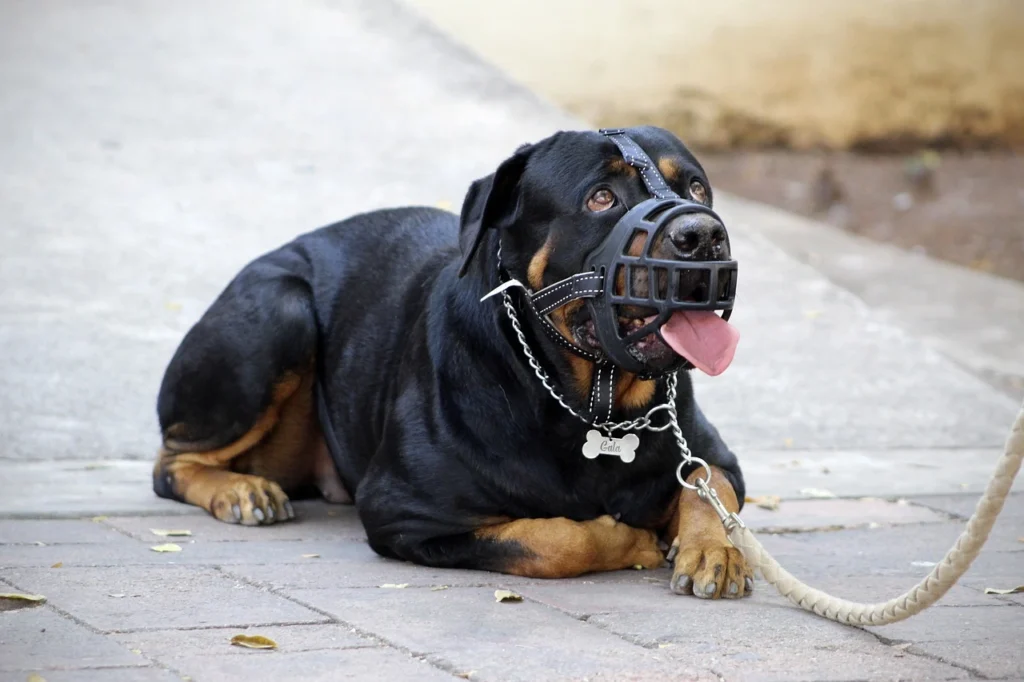
Animal Cruelty and Neglect
- New Jersey’s animal cruelty laws (N.J.S.A. 4:22-17) define prohibited acts like failing to provide adequate food, water, shelter, and veterinary care; abandoning an animal; and inflicting unnecessary suffering.
- Reporting suspected animal cruelty or neglect is crucial for protecting animals and holding perpetrators accountable.
Proper Sheltering
- New Jersey law prohibits exposing dogs and other companion animals to adverse environmental conditions for extended periods (N.J.S.A. 4:22-17.2).
- “Proper shelter” includes access to a clean, dry, and temperature-controlled space of appropriate size, with protection from the elements.
- Tethering of dogs is also regulated, with limitations on duration and access to proper shelter.
Rabies Control
- New Jersey mandates rabies vaccination for all dogs over seven months old (N.J.S.A. 26:4-78).
- This helps protect public health and the health of dogs themselves.
- Proof of vaccination is required for licensing and upon request by animal control officers.
Licensing and Registration
- All dogs over seven months old must be licensed and registered with the local animal control office (N.J.S.A. 4:19-15).
- Licensing helps track ownership, facilitates the return of lost pets, and ensures dogs are vaccinated against rabies.
- Fees vary depending on the municipality and whether the dog is spayed or neutered.
Animal Control
- Municipal animal control officers play a vital role in enforcing animal welfare laws, investigating complaints, and rescuing animals in distress.
- They are authorized to impound stray or lost dogs, ensure proper sheltering, and reunite them with their owners whenever possible.
Additional Considerations
- Supporting Animal Rescue Organizations:
- Many reputable animal rescue organizations in New Jersey work tirelessly to provide care and find loving homes for abandoned, neglected, or surrendered dogs.
- Consider volunteering your time, donating resources, or adopting a dog from a rescue organization.
Dog Entertainment and Work Laws in New Jersey
Dogs play a diverse role in our lives, from beloved companions to valued working animals. New Jersey recognizes this and has established various laws and regulations to ensure their safety and well-being in entertainment and work settings.

Animal Cruelty and Neglect
- New Jersey’s animal cruelty laws (N.J.S.A. 4:22-17) apply to all animals, including those used for entertainment or work.
- Prohibited acts include:
- Failing to provide adequate food, water, shelter, and veterinary care.
- Overworking or using animals in a way that causes unnecessary suffering.
- Depriving animals of rest and proper socialization.
- Reporting suspected animal cruelty or neglect is crucial for protecting animals and holding perpetrators accountable.
Service Animal Laws
- The Americans with Disabilities Act (ADA) and New Jersey’s Law Against Discrimination (LAD) protect the rights of individuals with disabilities to use service animals in public spaces.
- Service animals are defined as dogs specifically trained to perform tasks that assist individuals with disabilities, such as guiding people who are blind, alerting people with hearing impairments, or providing support for people with mental health conditions.
- Businesses and public facilities must allow service animals to accompany their handlers without restrictions.
- Emotional support animals (ESAs) are not considered service animals under the ADA or LAD and do not have the same legal protections.
Animal Welfare Regulations
- Depending on the specific activity, additional regulations may apply.
- For example, the New Jersey Department of Agriculture oversees the licensing and inspection of animal exhibitors and breeders, ensuring compliance with animal welfare standards.
- Similarly, the New Jersey Racing Commission regulates the horse racing industry, including the welfare of racehorses.
Child Labor Laws
- New Jersey child labor laws (N.J.S.A. 34:2-21 et seq.) restrict the employment of minors, including in occupations involving animals.
- These laws aim to protect children from hazardous work environments and ensure their safety and well-being.
Additional Considerations
- Responsible Training and Handling:
- Regardless of the context, dogs used for entertainment or work should be trained humanely and handled responsibly.
- Positive reinforcement methods and proper socialization are crucial for ensuring their well-being and preventing stress or anxiety.
- Breed-Specific Considerations:
- Certain breeds may be better suited for specific tasks due to their natural abilities and temperament.
- Responsible breeders and trainers should prioritize ethical practices and avoid exploiting breeds for activities that may be detrimental to their physical or mental health.
- Public Perception and Safety:
- When engaging with dogs in public spaces, it’s important to be mindful of others and ensure responsible interaction.
- Always ask permission before interacting with someone else’s dog, especially in working environments.
Dog Technology and Innovation Laws in New Jersey
As technology and innovation continue to shape our lives, the pet industry is also experiencing a surge in advancements. New Jersey, like many states, is grappling with the evolving landscape of dog technology and the need for potential regulations.

Current State of Dog Technology
- Emerging Products:
- Wearable devices: GPS trackers, activity monitors, and smart collars that monitor vital signs and provide health insights.
- Smart feeders and water bowls: Automatically dispense food and water, allowing for portion control and remote monitoring.
- Interactive toys and games: Stimulate dogs mentally and physically, promoting their well-being.
- Telehealth consultations: Connecting pet owners with veterinarians remotely for consultations and advice.
- Legal Framework:
- Currently, New Jersey does not have specific laws directly regulating pet technology products.
- However, general consumer protection laws and regulations apply, ensuring product safety and data privacy.
Potential Regulatory Considerations
- Data Privacy:
- As dog technology collects and transmits data, concerns arise about data security and privacy.
- Clear and transparent data collection and usage policies are crucial to protect user information.
- Potential future regulations might mandate specific data security standards for pet tech companies.
- Product Safety:
- Ensuring the safety and functionality of pet technology products is essential.
- Existing regulations for consumer products may apply, depending on the specific device and its functionality.
- Regulatory bodies like the U.S. Food and Drug Administration (FDA) might play a role in overseeing the safety of certain pet tech devices, particularly those with claims related to health monitoring or medical applications.
- Animal Welfare:
- The well-being of dogs should always be prioritized when developing and using pet technology.
- Devices should not cause discomfort, stress, or harm to animals.
- Responsible use and avoiding over-reliance on technology are crucial for maintaining a healthy relationship with your dog.
Additional Considerations
- Consumer Awareness:
- Pet owners should be informed about the potential benefits and limitations of dog technology.
- Researching reputable brands, understanding data privacy policies, and using these products responsibly are essential.
- Consulting with your veterinarian for guidance on using specific pet tech devices for your dog’s health and well-being.
- Innovation and Development:
- While potential regulations are important, fostering innovation in the pet tech industry can benefit both dogs and their owners.
- A balanced approach that promotes responsible development and protects animal welfare is crucial.
Human Coexistence Laws in New Jersey
New Jersey recognizes the profound bond between humans and dogs. While there are no specific “human coexistence laws,” several regulations and initiatives contribute to a positive and responsible environment for dogs and their owners.

Animal Cruelty and Neglect
- New Jersey’s animal cruelty laws (N.J.S.A. 4:22-17) play a crucial role in protecting dogs and ensuring their well-being.
- These laws define prohibited acts like failing to provide adequate food, water, shelter, and veterinary care; abandoning an animal; and inflicting unnecessary suffering.
- Reporting suspected animal cruelty is crucial for protecting dogs and holding perpetrators accountable.
Proper Sheltering
- New Jersey law prohibits exposing dogs and other companion animals to adverse environmental conditions for extended periods (N.J.S.A. 4:22-17.2).
- “Proper shelter” includes access to a clean, dry, and temperature-controlled space of appropriate size, with protection from the elements.
- Tethering of dogs is also regulated, with limitations on duration and access to proper shelter.
Responsible Pet Ownership
- New Jersey promotes responsible pet ownership through various initiatives.
- This includes:
- Licensing and Registration: All dogs over seven months old must be licensed and registered with the local animal control office (N.J.S.A. 4:19-15).
- Rabies Vaccination: Rabies vaccination is mandatory for all dogs over seven months old (N.J.S.A. 26:4-78).
- Public Awareness Campaigns: State and local agencies often run campaigns promoting responsible pet ownership practices, including proper training, socialization, and waste management.
Service Animal Laws
- The Americans with Disabilities Act (ADA) and New Jersey’s Law Against Discrimination (LAD) protect the rights of individuals with disabilities to use service animals in public spaces.
- This fosters inclusivity and allows individuals with disabilities to benefit from the companionship and assistance of their service dogs.
Additional Considerations
- Dog Parks and Recreation Areas:
- New Jersey has numerous dog parks and designated off-leash areas where dogs can socialize and exercise freely.
- These facilities promote responsible dog ownership and provide opportunities for dogs and their owners to enjoy outdoor activities together.
- Dog-Friendly Businesses:
- Many businesses in New Jersey, such as restaurants and cafes, are becoming increasingly dog-friendly.
- This allows owners to bring their furry companions along on outings and strengthens the human-dog bond.
- Positive Reinforcement Training:
- New Jersey promotes positive reinforcement training methods for dogs.
- This approach encourages desired behaviors through rewards and avoids using punishment, fostering a more harmonious and enjoyable relationship between dogs and their owners.
Other Relevant Dog Laws in New Jersey
Canine Good Citizen Programs and Legal Benefits in New Jersey
Canine Good Citizen (CGC) programs are designed to teach dogs basic manners and obedience skills, promoting responsible pet ownership and a safer environment for both dogs and humans. While not legally mandated, completing a CGC program can offer several benefits:
- Some insurance companies may offer discounts on homeowner’s insurance for dogs who have completed a CGC program.
- Landlords may be more inclined to accept dogs with CGC certification, especially in buildings with stricter pet policies.
- Certain dog parks or training facilities might require CGC certification for participation.
Dog Insurance and Coverage Laws in New Jersey
New Jersey has specific regulations governing pet insurance:
- This bill outlines guidelines for pet insurance policies in the state, including:
- Disclosure of pre-existing condition exclusions.Waiting periods for coverage.Prohibition of requiring veterinary exams for policy renewal.Transparency regarding optional benefits.
Laws Regarding Dogs in Hot Cars and Animal Endangerment in New Jersey
Leaving a pet unattended in a vehicle under dangerous conditions is illegal in New Jersey. However, there is currently no legislation explicitly authorizing individuals to break into a car to rescue an animal, even law enforcement.
Legal Aspects of Dog Parks and Shared Spaces in New Jersey
Dog parks and other shared spaces have specific rules and regulations to ensure the safety and well-being of all dogs and users:
- Leash laws are often enforced in public spaces, with designated off-leash areas for controlled play.
- Dog owners are responsible for picking up after their pets’ waste, maintaining hygiene and preventing the spread of disease.
- Owners are liable for any injuries or damage caused by their dogs, and aggressive behavior may result in fines or even removal from the park.
Dog-Related Property Damage and Homeowner’s Insurance in New Jersey
Dog bites and other dog-related property damage are covered under most homeowner’s insurance policies. However, specific coverage details and liability limitations may vary depending on the insurance company and policy.
Service and Working Dog Laws in Employment and Public Access in New Jersey
The Americans with Disabilities Act (ADA) and New Jersey’s Law Against Discrimination (LAD) protect the rights of individuals with disabilities to use service animals in public spaces and workplaces. These laws define service animals as dogs specifically trained to perform tasks that assist individuals with disabilities, such as guiding people who are blind, alerting people with hearing impairments, or providing support for people with mental health conditions
Animal Welfare and Protection Laws Against Neglect and Abandonment in New Jersey
New Jersey’s animal cruelty laws (N.J.S.A. 4:22-17) define prohibited acts like failing to provide adequate food, water, shelter, and veterinary care; abandoning an animal; and inflicting unnecessary suffering. Reporting suspected animal cruelty or neglect is crucial for protecting animals and holding perpetrators accountable.
This article has provided a comprehensive overview of dog laws and regulations in New Jersey, covering various aspects such as identification and microchipping, breeding and genetics, environmental impact, behavioral training, protection and rescue, entertainment and work, technology and innovation, and human coexistence.
Understanding and complying with these laws is crucial for responsible pet ownership and ensuring the well-being of dogs. By adhering to regulations, pet owners can contribute to a safer and more humane environment for their furry companions and society as a whole.
Following dog laws helps protect dogs from cruelty, neglect, and abandonment, promotes responsible breeding practices, minimizes environmental impact, and ensures responsible training methods are used. Additionally, compliance with regulations regarding service animals, dog parks, and shared spaces fosters inclusivity and harmonious interaction between humans and dogs.
By working together to understand and follow dog laws, we can create a more positive and responsible environment for all.
FAQs
What are the penalties for breaking dog laws in New Jersey?
Penalties for violating dog laws can vary depending on the specific offense. They can range from fines and community service to imprisonment in severe cases.
Can I bring my dog to the beach in New Jersey?
Yes, but with restrictions. Some beaches have designated dog-friendly areas and specific rules, such as leash requirements and time limitations. Always check local regulations before taking your dog to the beach.
What are the regulations for traveling with my dog in New Jersey?
New Jersey requires dogs to be up-to-date on rabies vaccinations for travel within the state. Additionally, some airlines and transportation companies may have specific requirements for transporting pets.
What should I do if I lose my dog in New Jersey?
Report the missing dog to your local animal control office immediately. You can also file a lost pet report online with the New Jersey State Police Missing Pet Registry.
Where can I find more information about dog laws in New Jersey?
The New Jersey Department of Health, Department of Agriculture, and Animal Control offices are valuable resources for information on specific dog laws and regulations. Additionally, the Association of Professional Dog Trainers (APDT) and animal welfare organizations can provide guidance on responsible pet ownership practices.






